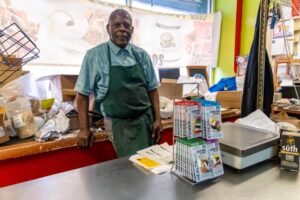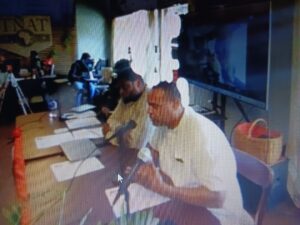 On Saturday, October 12, 2024, the “Electoral Poly-Tricks” Pan Afrikan Community Town Hall Meeting was held at the Temple of New African Thought, located on 5525 Harford Road in East Baltimore. The purpose of the Town Hall was not to present a candidates’ forum where political hopefuls would subject us all to their political platforms and their long lists of promises of what they will do for our community; it was planned as a discussion among us as a community about what motivates us to participate, or not participate, on the electoral process and to make the voting decisions we make. We believe we succeeded in meeting that goal.
On Saturday, October 12, 2024, the “Electoral Poly-Tricks” Pan Afrikan Community Town Hall Meeting was held at the Temple of New African Thought, located on 5525 Harford Road in East Baltimore. The purpose of the Town Hall was not to present a candidates’ forum where political hopefuls would subject us all to their political platforms and their long lists of promises of what they will do for our community; it was planned as a discussion among us as a community about what motivates us to participate, or not participate, on the electoral process and to make the voting decisions we make. We believe we succeeded in meeting that goal.
Sis. Tomiko, cultural anthropologist and founding director of Aging People in Prison Human Rights Campaign (APP-HRC), conducted the Libation to open the meeting. Bro. Cliff, Maryland Facilitator of the Sixth Region Diaspora Caucus (SRDC), member of the North America Regional Coordinating Committee of the Pan African Federalist Movement (PAFM) and Moderator of the Maryland Pan Afrikan Cooperative Coalition (MPACC), then went over the meeting plan for the Town Hall and explained the history of the Pan Afrikan Town Hall Meetings from 2007 to the present, after which he and Sis. Tomiko introduced the Maryland Pan Afrikan Cooperative Coalition (MPACC), the organizers of the Town Hall, and its cooperative coalition organizing strategy that includes the Seniors Advocacy Network, the Ubuntu Domestic Violence Collective and the Afrikan Women’s Defense Collective.
Bro. Cliff introduced the theme of the meeting: “Electoral Poly-Tricks”; proposed some questions to consider and assumptions we make as citizens when we go (or don’t go) to the polls. The aim of the Town Hall was to inspire the community to think when we go to the polls and to look ahead, after the elections, to build our own independent Pan Afrikan political infrastructure.
The Panelists present at the meeting were:
- Bro. Everett Winchester, Minister of Information for Universal Negro Improvement Association and African Communities League (UNIA-ACL) globally and President of the Division 106 Barca-Clarke (named for General Hannibal Barca and Dr. John Henrik Clarke) in Baltimore
- Bro. Nnamdi Lumumba, co-founder of Ujima Peoples Progress Party (UPP), which also is participating in the National Black Radical Political Convention (NBRPC), where he serves as Executive Secretary
- Dr. Dennis Ausar Winkler, founder of Temple of New African Thought (TNAT) Holistic Wellness Center, race-based trauma expert, social scientist, scholar-activist, counselor, educator, professor and podcast host
- Two more Panelists, Baba Khalid Raheem (New Afrikan Independence Party and National Black Radical Political Convention, Pittsburgh, Pennsylvania) and Baba Charles Barron (former city council member and independent Pan Afrikan activist, also with the National Black Radical Political Congress, New York City, New York) would join the discussion later over Zoom.
The panelists begin by sharing their general views
Bro. Everett Winchester described the electoral process as “very difficult”. We look for what feels good to us, the “lesser of two evils”, but not what gets us power. We should know every elected official in our community so we can know who to pressure to ensure we get something in return for our vote. Other geographical jurisdictions and ethnic/racial communities get more from their candidates because they are better organized to wield power than we are.
Bro. Nnamdi Lumumba’s organization, UPP, is geared around de-mystifying politics and building power in the electoral arena. The purpose of politics is to make decisions, make policy and determine who gets resources. Elections have a particular part in this. We use ideas from Western Europe which doesn’t really have democracy (more like an advanced, refined version of feudalism) and from the United States which doesn’t have real democracy either, having built itself by enslaving and exploiting others, most specifically our ancestors and our Sisters and Brothers in Afrika and the Global South. The process of real democracy is working together cooperatively. Maurice Bishop’s Grenada pursued this goal before it was destabilized by US and other foreign intervention. In the United States, we only talk about democracy when we are told to vote every two, four or six years. The intent of elections is to wage a nonviolent struggle for control of the state, to replace the warlords’ historical ways of violence and bloodshed. Control of the state is important because it means control of the courts, the police and the legislatures that decide what resources get deployed for the people. We don’t look at it that way so we come across as beggars during election season.
Dr. Ausar Winkler noted that we only look at politics through the lens of electoral politics. Political statements are made everywhere, including our choice in clothes. We all believe we are doing the right thing, even those who are voting for Trump. There is the White Supremacist Republican Party and the White Feminist liberal party, the Democrats. The most radical you can be (without being punished) is what the White Feminists prescribe in the Democratic Party. We need to have more nuanced and sincere discussions, including “what is my body”. We also have to look at the man, woman and child and not get caught up in White Feminist attitudes.
Bro. Everett noted that the system was not meant for us; it was meant to keep us down. In a race for economic power, resources and education, Dr. Claud Anderson says we are in last place. We need to come together and start demanding things; until then, others are making decisions for us, including decisions that impact our Sisters and their bodies. The Honorable Marcus Mosiah Garvey said everywhere he went in the world, Black people were on the bottom, and Bro. Everett sees this today. This system was not meant for us, and we need to come together and fight for those things our people need.
Bro. Nnamdi started talking about some of the assumptions we make. We assume that we have to vote for one side of White Power and White Supremacy or the other; capitalism, theft of land, and exploitation of others are built into that choice. Winning power is not always the same as winning elections. Elections are held to determine control of the state. If we don’t have that available to us, winning power over our own local community becomes part of the struggle to win power over our lives. Putting leadership that is always ignored up front. Building power in the community between elections. We have to address and dismantle the assumptions that are built in.
Dr. Ausar noted that most Black men are not voting for Trump, despite what some in the media (and even our own community) like to claim. Most vote Democratic and are for reinstating Roe v. Wade, but the media makes it seem otherwise. Black men and Black women generally agree (both around 68%) in favor of Roe v. Wade. More White women than White men do. How do these issues show up in our houses, our living rooms? But we unfortunately tend to believe all types of things and don’t analyze the propaganda. Many of us don’t have time to read as much as we need to if we want to cut through the propaganda. We need to have more frequent, deeper, and more thoughtful conversations around these issues and we need to collectively make these decisions, including looking at why our Sisters even need to have abortions.
Bro. Nnamdi noted that Sisters are an extremely consistent and reliable voting bloc. And those who say Kamala Harris is not Black (a notion that was largely triggered by Trump’s claim at this summer’s National Association of Black Journalists convention that “she suddenly became Black”) are falling for the flim-flam and vicious lies propagated by White racists. “She is an Afrikan. She is an Afrikan. She is an Afrikan.” Whether she serves our interests or not is another discussion. And we cannot ignore the concerns of our Sisters. If we are going to talk about democracy, the majority (Sisters) must be heard. We cannot live in a world where half our intellect, labor and voices are ignored. We cannot allow White Supremacy to take half of our voice and labor. But this is nothing new. This has been done to us throughout history.
Bro. Everett, as the father and grandfather of Black women and girls, stated that we must make sure the Black Woman is nurtured correctly and is heard. Most teachers are women, and women tend to be better educated. Our problems should be discussed and solved together as Black Men and Black Women and not separated. Whatever his wife feels, that’s his opinion. Whatever we feel collectively is his vote. Mama Earth is the Lady President of UNIA-ACL Chapter 106 Barca-Clarke, which is reflective of this philosophy.
Dr. Ausar feels decisions regarding the man’s body as well as the woman’s should reflect the needs of the community if we’re going to get into regulating the woman’s reproduction by our community. Men’s reproductive behavior should be as regulated as women’s.
Community Comments and Interactive Discussion
There are people in our community who “fall through the cracks” and are still often not seen by the “phenomenal” organizations and hard-working activists in our community. The people in the cracks need to be better seen by the activists with all these organizations we have.
Bro. Everett said we need to create our own political entity. UNIA-ACL is more than just a flag. There is a government aspect. It’s there for all of us, hence the “Universal” part of the name. We can start to govern ourselves in our community.
Bro. Nnamdi noted that civics are no longer taught in schools. People in power take advantage of people who do not know. Introducing political education to our communities is an objective of UPP.
Dr. Ausar noted that we are indoctrinated into the system so we believe that what we learn in academia is the most revolutionary you can be. Henry Louis Gates noted going into the mainstream academic and political institutions with Afro combs and coming out eating caviar.
It was noted that protecting our families is more important than just the politics. One suggestion was to “take the woman off the market”, deny the services of our Black Women to the system. We all need to be in recovery because of the “isms” we have all been put through.
It was stated that government is important. Much of the support for Kamala Harris is primarily to prevent Trump from regaining the levers of power. The reason this country is not in rebellion (though it should be) is largely because Trump has been allowed to run for president when he really should be in prison.
Bro. Nnamdi noted that White Supremacy is in crisis. Kamala Harris is another chess move in this larger game between political action committees. We need to be in control of the candidates, the political action committees and the campaigns. In France, the right wing has denied their election. This is one example of how fascists are coming to power in response to White Supremacy’s crisis, trying to keep the power they have stolen. Trump’s plan was written in 2021 by a think tank. The ideas of Project 2025 are already being implemented in state capitals across the US. The plan is already written so he is only the icing on the cake. This is organized repression which must be met by organized resistance, which we largely lack because we are not truly organized.
Bro. Everett noted that we need to be honest about who we are as a collective. Harris says she has no specific agenda for Black people; if she says she does she will lose the White vote. Trump represents White Power and is unashamed to show it. Until we have someone who is from us and about us, ready to fight for us, our voice is muted.
Sis Tomiko mentioned the different political parties that are running (Green Party, Party of Socialism & Liberation, Libertarian Party, Dr. Cornel West’s independent campaign). Which ones should we look at?
Bro. Nnamdi said UPP has not endorsed any party, but the Party for Socialism and Liberation’s (PSL, with Claudia De La Cruz running for president) positions are interesting. The Green Party’s (Dr. Jill Stein as the presidential nominee) positions are well thought out, and the National Black Radical Political Convention, being held on October 26-27, has supported Dr. Cornel West’s efforts. You can also write in candidates; he has written in Mumia Abu-Jamal for president numerous times. If you have to hold your nose to vote, what does that do to your consciousness?
Bro. Everett noted that we are the First People, we are phenomenal. We need to go from asking for a piece of the pie to demanding the whole pie. In the Park Heights neighborhood, we see the Black side and the Jewish side that get different quality of services. We need the whole pie. We need to learn our history in our schools. We don’t learn about Garvey, we don’t control what we learn in our schools.
Building Our Own Black Agenda?
Bro. Nnamdi noted that even when we could not vote we had a level of organization and activity. Public school education came from Black Republicans way back when that was a progressive party. For the Jewish community, the ideological glue was often Zionism. Where is our ideological glue? Where is our ability to punish those who make decisions that go against us? National politics is so often out of our weight class.
Dr. Ausar acknowledged that we all want to see the best for our people. There are individual people in political positions that wish and mean us well. We often miss each other’s arguments though. Some of us are trying to survive under the status quo (things staying the same, wanting to make things better but not rock the boat too much to avoid repercussions) while others are speaking from a liberation framework about top-to-bottom revolutionary change. Some friends of ours who are in political positions want to do things and say things but are afraid to do so. Many of our people are suffering in deplorable conditions, more so than some Third World countries. What is going to liberate us? People working in the system too often call the revolutionaries insane, idiotic and crazy. People are beating up on third party politics. Dr. Ausar is all about third parties and wants to support them so they can reach 5% of the popular vote and gain some of the perks of reaching that status.
Baba Khalid Raheem greeted the meeting panel from Pittsburgh, Pennsylvania over Zoom. Before the 1960’s we had just a handful of Black elected and appointed officials, less than 200. Now we have more than 2000, but one might think we still had only 200. The numbers have not equated to political power. We gave our political power to one of the two major parties. First we went to the Republican Party, but then they sold us out in the 1870’s in the Hayes-Tilden Compromise. Then they sold us out again in the Civil Rights era. Now we must develop our own independent political parties. Most of us are regular working-class people or working in the gig economy. We need to develop a political agenda and organization that represents our situation as a people, and stop just going along with the Democratic Party. We must break that culture and move to another level. The New Afrikan Independence Party and the National Black Radical Political Congress are important organizations he is working with.
It was stated that in Baltimore we have a closed primary system that limits the ability of independent political candidates and parties to win in elections. Most of the Afrikan organizations represent the tip of the spear but are out of touch with the largest voting constituency, Elder Black Women. Pan Afrikan activists need to get in touch with the grassroots community organizations. There is a Baltimore directory that lists the neighborhood organizations’ meeting dates. We also need independent freedom schools like what we once had with the Soul School Institute and the Timbuktu Center.
Bro. Nnamdi noted that the number of independent voters has grown every year, which is going to change the game. Primary elections are won by a minority of voters, and general elections are often run unopposed by the winner of the primary. We don’t seem to realize that the winner of the primary did not win the overall election, and we need better civics education so we can realize that and use that to our advantage.
The two-party system that controls Maryland’s politicians has a sitting governor and presidential candidate that are party to an ongoing genocide in Gaza, even making it illegal in some cases for businesses to boycott Israel. Cooperation Jackson (Jackson, Mississippi, founded by Ancestor Chokwe Lumumba and now supported in part by his son, Jackson mayor Chokwe Antar Lumumba) has been responding to economic extraction and racism through three pillars: anti-imperialist political candidates, people’s assemblies where the community comes up with a collective people’s agenda and selects their representatives, putting economics behind politics and rejecting individualism (which would be nothing more than resorting to capitalism in blackface) in favor of cooperative economics. We can build something like that here.
Professors and scholars talking only to professors and scholars will miss the people in the cracks. These issues that impact us have been talked about for over 77 years at least, and some of us act as though this is something new. There is information about food distribution centers and other sources of community help that our activists and organizers have been unaware of or have even ignored.
Bro. Everett said that UNIA-ACL has reached out to numerous community organizations and last year held a Town Hall that invited community organizations. Earlier today, they participated in a community clean-up. Whenever we start moving as a community we should adopt a Race First consciousness. We need to start talking about what is impacting our community so we can invest, strategize and build together. If Kamala Harris is not doing anything for our community (a claim which has been disputed by others), that is on us for not putting the pressure on her to do for our community if she wants our support.
Bro. Nnamdi noted that Cooperation Jackson’s (Jackson, Mississippi) model is anti-capitalist and thus is different from, for example, Dr. Claud Anderson’s model. With regard to Pan Afrikan organizations reaching out (or not reaching out) to community groups, Bro. Nnamdi is also on the board of a local community organization, and connecting is hard. Pan Afrikan activists cannot just “stick and move”, visiting a community organization and then moving on to the next one; they have to “stick and stay”. They must be able to remain involved with those communities and be prepared to dig in with them.
Dr. Ausar urged us to remember that this work is exhausting. We become tired and it’s easy to start pointing fingers, and we must fight the urge to do that; most of us mean well. We are tired, and organizing is hard. We need to be able to re-charge our bodies, and we need to listen to each other and realize the ways in which we can get triggered when we are all talking at each other instead of talking to each other. We need to evolve our ideas so we don’t get confused by the Black capitalist agenda.
Sis. Tomiko noted that many of those in the meetings of activists and foundations on a larger scale are not Pan Afrikan activists but are people who work in foundations and have jobs with them. Often there are only a few real Pan Afrikan activists in these larger meetings.
Bro. Cliff noted that activists simply don’t have the people to be everywhere. He mentioned a meeting he had on behalf of the Sixth Region Diaspora Caucus (SRDC) about 15 years ago with the then-director of a local community organization umbrella group to try to reach all of the neighborhood organizations where people of Afrikan descent live. SRDC sought to reach out to the people in our community groups to get their involvement in building our own Pan Afrikan Agenda back then, so we could use it to build unity, pressure local politicians, develop self-help initiatives and take our grievances with the United States to international organizations like the African Union and United Nations. We did not know who all the organizations were and how to contact them, so meeting with this umbrella organization seemed to be a good place to start to get some direction and advice. The director told us to go talk to the Continental Africans instead of the Black community organizations, clearly not understanding what SRDC’s objectives were despite having been told. There are assumptions we make about each other and we judge each other prematurely, which stifles our efforts to move forward.
Baba Charles Barron, former New York City Councilman, joined the Zoom as a panelist. He came out of the Black Panther Party movement and ran for public office and beat the establishment Democratic machine that was backed by president Barack Obama, Congressmember Hakeem Jeffries and current New York mayor Eric Adams. He and his allies won city and state assembly seats. They overcame the Negro Democratic Party structure for 21 years. They established schools, secured the freedom of three political prisoners and brought economic programs to the community. They stopped gentrification, opposed landlords, pursued a reparations agenda and built a community center that the community will soon own. Mainstream Negro politicians, on the other hand, saw their neighborhoods gentrified. Now he is working with the National Black Radical Political Congress with Bro. Nnamdi and Baba Khallid. Revolution will happen from the bottom up, not the top down. He is backing the independent candidacy of Dr. Cornel West for US president.
Bro. Nnamdi stated that Baba Barron ran as a Democrat but built an independent infrastructure that took control from the mainstream Democrats. You can run as a Democrat if you are ready to build that independent infrastructure and take control from the Democratic Party on behalf of the people.
Mama Earth stated that we don’t have enough patience and compassion with one another. Many of us in our organizations are going through a lot ourselves and we can’t always run after all the other organizers and activists. Some of us don’t have enough time to handle all the responsibilities we have on the organizational as well as personal level. We need to come together and build with each other so we can do what we must do collectively without becoming overwhelmed. We can’t do it alone. We have to do it together in a united front.
Everyone has something going on in their organizational as well as personal lives. We can all do only so much by ourselves. If we center too much on ourselves, we run the risk of losing the “I Am Because We Are” perspective that is so important to our ability to move our people forward.
Kamala Harris, whatever our criticisms of her may be, is seen as vastly different from Donald Trump, who we already know is damaging to the country and world as well as to the already-destructive mindset of many of his followers. Until a revolution takes place, many of us will support Kamala Harris if for no other reason than to defeat Trump.
Bro. Nnamdi noted that Baba Charles Barron will be a participant in the NBRPC conference. Visit https://nbrpc.org for more information. Also, he understands and respects the support for Kamala Harris, but his refusal to support a political party that is participating in genocide should be respected also. The Biden-Harris administration is participating in the genocide of Gaza through its support of Israel, and he chooses not to support them. Although he was not here to tell anyone who they should vote for, he is guided by the conviction that “Afrikan people can live without imperialism.” We need to organize ourselves to make this happen.
Sis Tomiko stated that she heard an Indigenous activist on WPFW-FM (Washington, DC) state that a number of Indigenous activists were planning to sit this election out because they will not support genocide.
In answer to a question about obtaining agricultural visas for Black Farmers and Urban Farmers like in the Park Heights area of Baltimore, Bro. Everett noted that UNIA-ACL has agricultural gardens in Curacao and Liberia. The League of Nations acknowledged UNIA as a government on the days before it became the United Nations and had instituted a procedure where UNIA was a place to go to obtain visas until UNIA came under attack by the Federal Bureau of Investigation’s (FBI) COINTELPRO.
An attendee on Zoom commented that we must get out of the Democrat-Republican mindset and build our own political base. “You are the ones doing the work.” We must stop inviting people from the outside that just want to talk about what they’re going to do but do nothing but represent the lobbyists and corporations that fund them. We must choose our own candidates and leaders. Baba Khalid Raheem invited them to join NAIP, UPP or NBRPC. In Pennsylvania, there are also closed primaries. The New Afrikan Independence Party has run candidates for mayor of Pittsburgh and for county council seats and got up to 12 percent of the vote, from people who were not in the New Afrikan Independence Party. Similar efforts have been undertaken elsewhere in the country. A Race First approach sounds good but we must be principled first, else we will be drawn to Black politicians who do not share a revolutionary Black perspective and could sell us out to our enemies.
The need for independent candidates was emphasized, and perhaps Bro. Nnamdi can take the lead here. We should put our money behind candidates who can meet our needs. Run for office like Baba Charles Barron did in Brooklyn.
Do We Have an Agenda of Our Own?
Bro. Everett commented that it must be an overall community-uplift objective. Resources, educational system and businesses need to be looked at, and a candidate or a party needs to look at these and include the community. Race First is about doing what will benefit our Afrikan family even if the supported candidate is not an Afrikan themselves. Other cultures move by looking out for their communities: Jewish, Asian, Latino. We must start looking out for each other. Vote for and support those things that are in our favor.
Bro. Nnamdi stated that we need to have an assembly to talk about what our agenda will look like, realizing that we are not monolithic and will have different ideas. We also need the infrastructure to make it happen and a democratic structure for our community to have a voice, and no room for an imperialistic agenda. Our existence will always be in peril as long as White Supremacy and imperialism are allowed to continue to exist.
Dr. Ausar noted that we must discuss in a sincere manner, and places like this must be healing spaces where we can have these conversations. We say we are the choir, but we’re not. We are the ones who actually need healing. We’re struggling and we don’t know how to get along with each other. If we don’t learn how to coexist and to disagree and debate in sincerity and love, we are in trouble. The whole “Kamala or not” argument is a case in point, assuming that no one here is going to vote for Trump. We can’t just see ourselves as the “special ones” going out to heal the community when we need healing ourselves.
Bro. Cliff made three points. (1) We need healing as Dr. Ausar said; he used now-Ancestor Mama Iyaluua Ferguson’s statement after Imam Jamil Al-Amin/H. Rap Brown was convicted and sentenced; “People say we’re preaching to the choir. If we’re a choir, we’re damn miserable. We were supposed to save him.” (2) We need to vote strategically, whether we vote for a third party to support it long term or vote for which candidate we are ready to fight for the next four years. People cried in joy when Obama was elected but got mad when he did things we could not stand, such as prosecuting whistleblowers, ignoring the World Conference Against Racism review sessions, increasing drone raids in Afghanistan and bombing Libya into the previous century, things he did because he was the president of the US and not just for us. No president is going to have an agenda just for us; whoever wins, we must be ready to fight, but we have failed to fight, either waiting for our hero to fix things or hiding from our enemy. We must organize between elections, not just every four years. (3) We need to build an independent Pan Afrikan political organization, a grassroots community council, and our own Pan Afrikan Agenda which will be regularly reviewed and updated to create a cooperative agenda, steps which we have refused to take so far. People in attendance here and on Zoom made important comments and they must be involved in building a cooperative, comprehensive Pan Afrikan Agenda that we all can embrace.
We will hold more of these Town Hall Meetings in the future, including sessions to build that cooperative, comprehensive Pan Afrikan agenda. We asked those in the chat and those in attendance here to provide their contact information so we can reach out to them and work on building from here.
UPP had copies of its official publication, The Progress Report, on sale on the back of the room. Also in the back, Diasporan Soul Kitchen was open for those who wanted to purchase some excellent, tasty and healthful food and drink.
We will provide updates to our ongoing efforts to build that Pan Afrikan Agenda. Watch this space for more information and insights on the US elections, which are presently upon us, and how we as Afrikan People can organize ourselves to weather whatever storms spring from the election results. Groups at the regional, national and Diaspora levels are making connections to try to build a broader, collective, cooperative unity. The Maryland Pan Afrikan Cooperative Coalition (MPACC) will seek to be part of these efforts to bring our people together on the local, national and global levels.
Like this:
Like Loading...
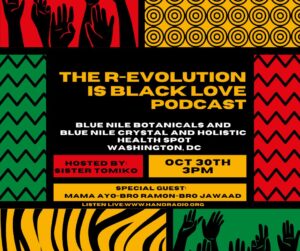 The Wednesday, October 30 edition of “The R-Evolution Is Black Love” features the proprietors of the Blue Nile, a longtime staple of the Georgia Avenue corridor of Washington, DC, located near Howard University in Northwest Washington, DC. Show host Sis. Tomiko interviews Mama Ayo, Bro. Ramon and Bro. Jawad. The video of the interview can be viewed at this link for a limited time:
The Wednesday, October 30 edition of “The R-Evolution Is Black Love” features the proprietors of the Blue Nile, a longtime staple of the Georgia Avenue corridor of Washington, DC, located near Howard University in Northwest Washington, DC. Show host Sis. Tomiko interviews Mama Ayo, Bro. Ramon and Bro. Jawad. The video of the interview can be viewed at this link for a limited time:
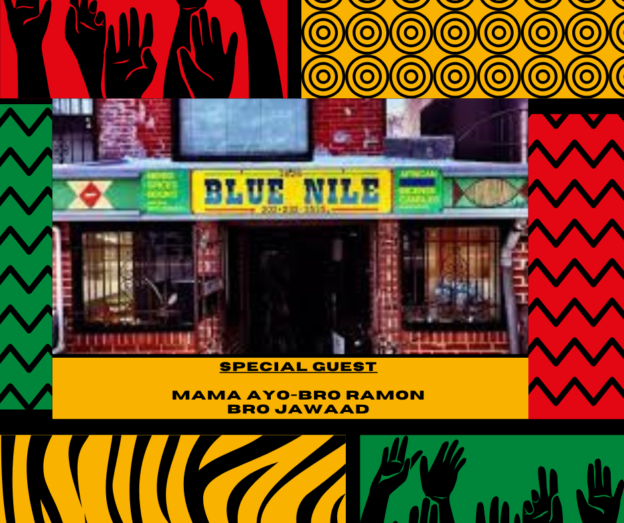
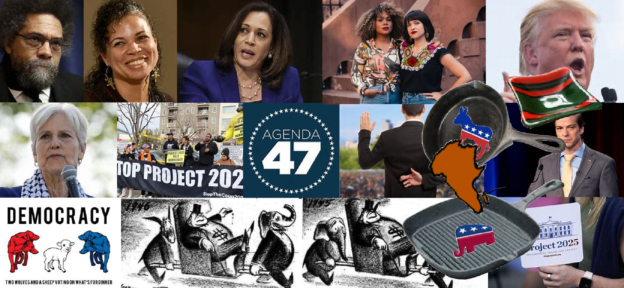
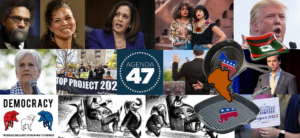 The country holds its breath as Election Day approaches. The major candidates hold massive rallies in a last-ditch effort to mobilize voters in their favor, even as they confidently predict victory for themselves and their followers nervously watch the early vote totals and crunch the latest poll numbers. People in the electorate struggle to sort out fact from fiction in the face of a constant onslaught of disinformation (complete with “deep fake” videos and posts on X), they speculate among each other about the latest developments, they argue in favor of their preferred candidates, or they debate the merits of participating in the electoral process at all. For someone trying to understand the political intrigues and make an informed voting decision, things can get quite confusing.
The country holds its breath as Election Day approaches. The major candidates hold massive rallies in a last-ditch effort to mobilize voters in their favor, even as they confidently predict victory for themselves and their followers nervously watch the early vote totals and crunch the latest poll numbers. People in the electorate struggle to sort out fact from fiction in the face of a constant onslaught of disinformation (complete with “deep fake” videos and posts on X), they speculate among each other about the latest developments, they argue in favor of their preferred candidates, or they debate the merits of participating in the electoral process at all. For someone trying to understand the political intrigues and make an informed voting decision, things can get quite confusing. On Saturday, October 12, 2024, the “Electoral Poly-Tricks” Pan Afrikan Community Town Hall Meeting was held at the Temple of New African Thought, located on 5525 Harford Road in East Baltimore. The purpose of the Town Hall was not to present a candidates’ forum where political hopefuls would subject us all to their political platforms and their long lists of promises of what they will do for our community; it was planned as a discussion among us as a community about what motivates us to participate, or not participate, on the electoral process and to make the voting decisions we make. We believe we succeeded in meeting that goal.
On Saturday, October 12, 2024, the “Electoral Poly-Tricks” Pan Afrikan Community Town Hall Meeting was held at the Temple of New African Thought, located on 5525 Harford Road in East Baltimore. The purpose of the Town Hall was not to present a candidates’ forum where political hopefuls would subject us all to their political platforms and their long lists of promises of what they will do for our community; it was planned as a discussion among us as a community about what motivates us to participate, or not participate, on the electoral process and to make the voting decisions we make. We believe we succeeded in meeting that goal.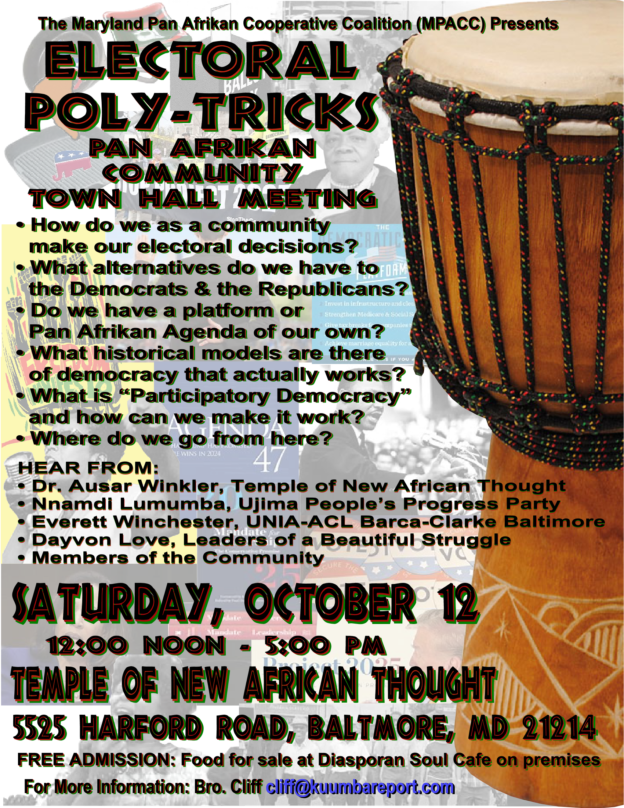
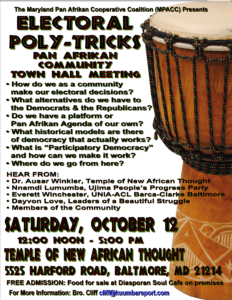 Coming up on Saturday, October 12, 2024 at the Temple of New African Thought (TNAT), the Maryland Pan Afrikan Cooperative Coalition (MPACC) will hold our third Pan Afrikan Community Town Hall Meeting of the year. Our theme will be a look at the electoral process and how we are approaching it as a community, and we have named it the “Electoral Poly-Tricks Pan Afrikan Community Town Hall Meeting”.
Coming up on Saturday, October 12, 2024 at the Temple of New African Thought (TNAT), the Maryland Pan Afrikan Cooperative Coalition (MPACC) will hold our third Pan Afrikan Community Town Hall Meeting of the year. Our theme will be a look at the electoral process and how we are approaching it as a community, and we have named it the “Electoral Poly-Tricks Pan Afrikan Community Town Hall Meeting”.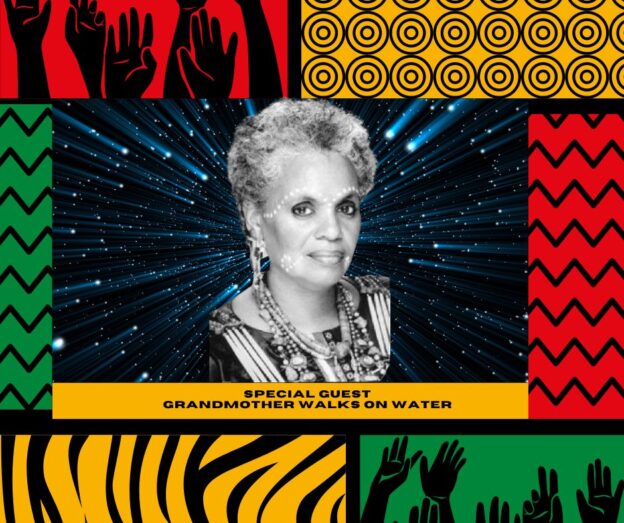
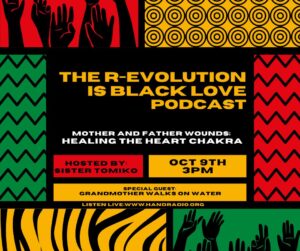 “The Revolution Is Black Love” (Wednesday afternoons at 3:00 PM ET) features frequent guest, Choctaw Elder Grandmother Walks On Water on Wednesday, October 9 on HANDRadio (
“The Revolution Is Black Love” (Wednesday afternoons at 3:00 PM ET) features frequent guest, Choctaw Elder Grandmother Walks On Water on Wednesday, October 9 on HANDRadio (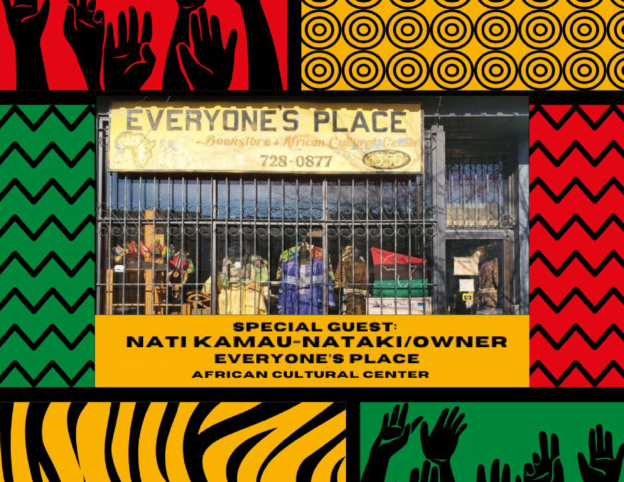
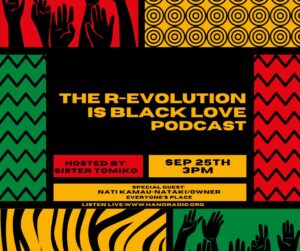 The anticipated day has finally arrived. Sis. Tomiko, host of “The R-evolution Is Black Love”, heard every Wednesday at 3:00 PM ET on Hand Radio (
The anticipated day has finally arrived. Sis. Tomiko, host of “The R-evolution Is Black Love”, heard every Wednesday at 3:00 PM ET on Hand Radio (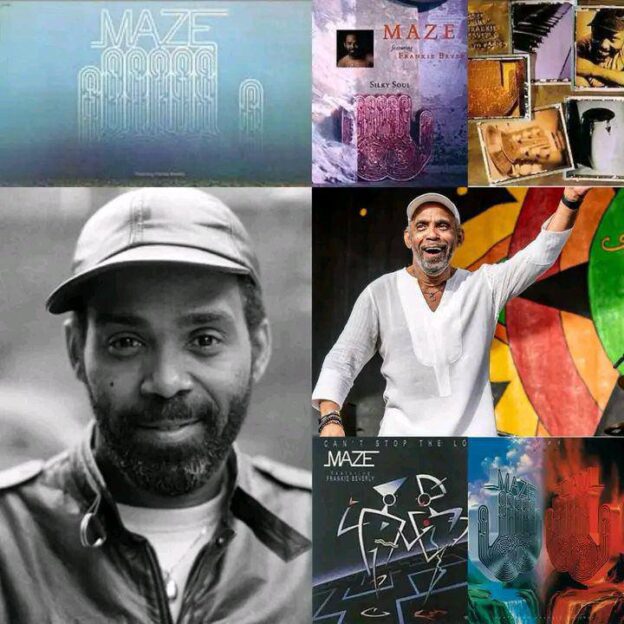
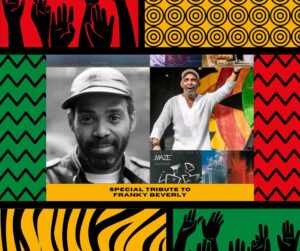 “We broke into our regular programming” for a special tribute to Maze founder and leader Frankie Beverly, said Sis. Tomiko (Baltimore, Maryland), host of The R-evolution Is Black Love (Wednesdays at 3:00 PM Eastern Time, HandRadio,
“We broke into our regular programming” for a special tribute to Maze founder and leader Frankie Beverly, said Sis. Tomiko (Baltimore, Maryland), host of The R-evolution Is Black Love (Wednesdays at 3:00 PM Eastern Time, HandRadio, 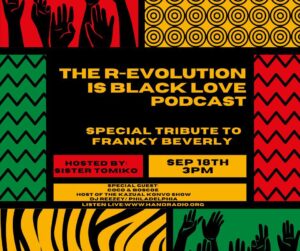 The guests spoke of several Philadelphia music artists who embodied the spirit of “raw love” as Philly’s native son Frankie Beverly did, as well as his connection to Philadelphia predecessors, contemporaries and successors such as McFadden & Whitehead, Kindred the Family Soul, Kenny Gamble, Jill Scott, Erykah Badu and other artists with Philly roots.
The guests spoke of several Philadelphia music artists who embodied the spirit of “raw love” as Philly’s native son Frankie Beverly did, as well as his connection to Philadelphia predecessors, contemporaries and successors such as McFadden & Whitehead, Kindred the Family Soul, Kenny Gamble, Jill Scott, Erykah Badu and other artists with Philly roots.
 It is not often that the Cultural Community must endure the loss of three icons in the span of six days. That happened this week, when first Brazilian bossa nova and jazz-funk legend Sergio Mendes passed on to the Ancestors at 83 years of age on September 5 after a bout with long COVID, then it was announced on September 9 that James Earl Jones had transitioned at the age of 93, and finally, R&B legend Frankie Beverly, the founder and leader of Maze, left this mortal plane on September 10 at the age of just 77, shortly after announcing his retirement from performing and embarking on a farewell/thank-you tour.
It is not often that the Cultural Community must endure the loss of three icons in the span of six days. That happened this week, when first Brazilian bossa nova and jazz-funk legend Sergio Mendes passed on to the Ancestors at 83 years of age on September 5 after a bout with long COVID, then it was announced on September 9 that James Earl Jones had transitioned at the age of 93, and finally, R&B legend Frankie Beverly, the founder and leader of Maze, left this mortal plane on September 10 at the age of just 77, shortly after announcing his retirement from performing and embarking on a farewell/thank-you tour.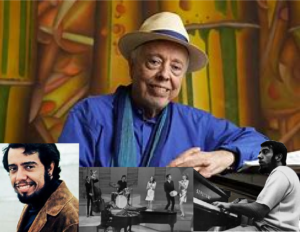 I remember listening to classic tracks from Sergio Mendes and Brasil 66 on my father’s old stereo in the 1960s. Songs like “Fool On The Hill” and perhaps his most famous release, Jorge Ben’s “Mas Que Nada”, lit up the air in our house with their Afro-Brazilian rhythms and melodic vocals. “Mas Que Nada” would be covered and remixed by numerous Brazilian, Afrikan and World Beat artists, and Mendes himself issued a remix of the track in 2009 in collaboration with the Black Eyed Peas that reimagined the song in both Hip-House and Brazilian-House versions.
I remember listening to classic tracks from Sergio Mendes and Brasil 66 on my father’s old stereo in the 1960s. Songs like “Fool On The Hill” and perhaps his most famous release, Jorge Ben’s “Mas Que Nada”, lit up the air in our house with their Afro-Brazilian rhythms and melodic vocals. “Mas Que Nada” would be covered and remixed by numerous Brazilian, Afrikan and World Beat artists, and Mendes himself issued a remix of the track in 2009 in collaboration with the Black Eyed Peas that reimagined the song in both Hip-House and Brazilian-House versions.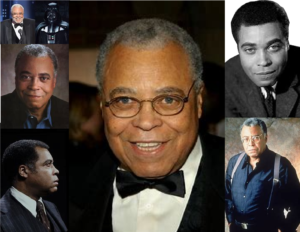 What Brother didn’t wish he could conjure a voice with the resonant baritone and gravitas of James Earl Jones? What Sister didn’t feel just a little flutter when he delivered his lines on stage and film? My first memory of seeing him in person (I only saw him twice as I can recall) was when I was in high school (I think) at a theater production of Othello in Washington, DC. The second time, my wife and I traveled to New York City in 2008 to catch the Broadway stage production of Tennessee Williams’s “Cat On A Hot Tin Roof” which featured an all-Black cast of Mr. Jones, Phylicia Rashad, Giancarlo Esposito, Terence Howard (making his Broadway debut) and Anika Noni Rose.
What Brother didn’t wish he could conjure a voice with the resonant baritone and gravitas of James Earl Jones? What Sister didn’t feel just a little flutter when he delivered his lines on stage and film? My first memory of seeing him in person (I only saw him twice as I can recall) was when I was in high school (I think) at a theater production of Othello in Washington, DC. The second time, my wife and I traveled to New York City in 2008 to catch the Broadway stage production of Tennessee Williams’s “Cat On A Hot Tin Roof” which featured an all-Black cast of Mr. Jones, Phylicia Rashad, Giancarlo Esposito, Terence Howard (making his Broadway debut) and Anika Noni Rose.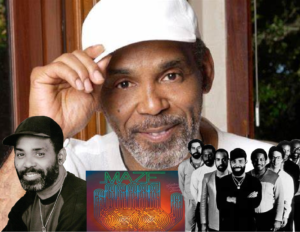 How many of us didn’t wish we could sing like Frankie Beverly? How many times have we practically begged the DJ (I should know, I’ve been a DJ for over 40 years) to play “Before I Let Go” by Maze, even after Beyonce had released her cover of the iconic song? Maze and Frankie Beverly were a fixture from my college years in the late 1970s and early 1980s to the present day.
How many of us didn’t wish we could sing like Frankie Beverly? How many times have we practically begged the DJ (I should know, I’ve been a DJ for over 40 years) to play “Before I Let Go” by Maze, even after Beyonce had released her cover of the iconic song? Maze and Frankie Beverly were a fixture from my college years in the late 1970s and early 1980s to the present day. 
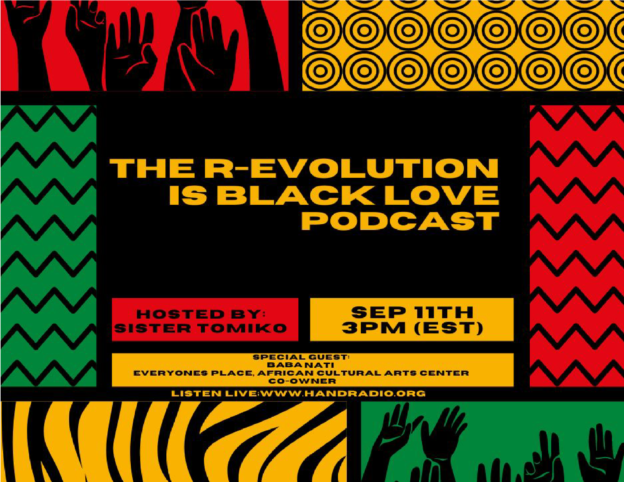
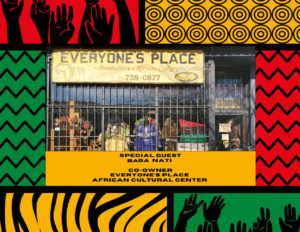
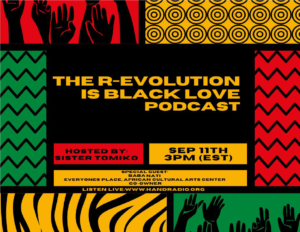
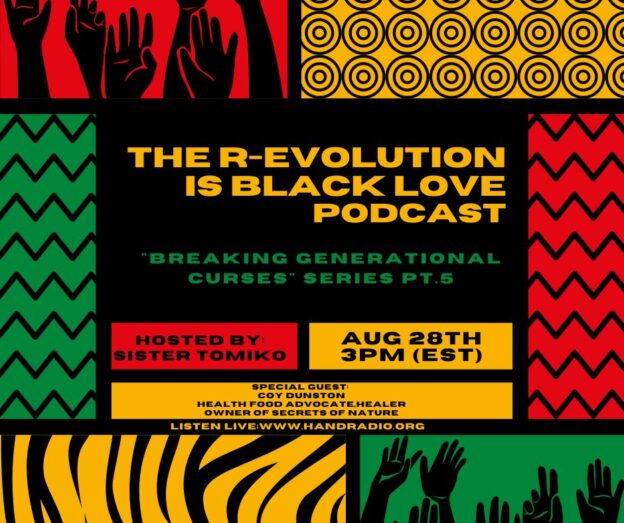
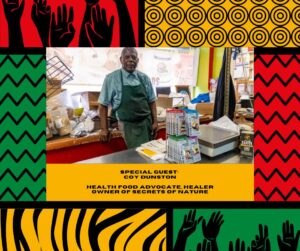 The Wednesday, August 28 edition of “The R-Evolution Is Black Love” features Baba Coy Dunston, proprietor of Secrets of Nature in Washington, DC. Sis. Tomiko, host of “The R-Evolution Is Black Love”, interviewed him at his location about his introduction to healthy foods and the struggles he has endured to continue to promote healthy choices for the people. The program airs at 3:00 PM Wednesday, August 28. “The R-Evolution Is Black Love” can be heard every Wednesday at 3:00 PM on HANDRadio,
The Wednesday, August 28 edition of “The R-Evolution Is Black Love” features Baba Coy Dunston, proprietor of Secrets of Nature in Washington, DC. Sis. Tomiko, host of “The R-Evolution Is Black Love”, interviewed him at his location about his introduction to healthy foods and the struggles he has endured to continue to promote healthy choices for the people. The program airs at 3:00 PM Wednesday, August 28. “The R-Evolution Is Black Love” can be heard every Wednesday at 3:00 PM on HANDRadio,  Understanding the dire need for healthy food options, Coy Dunston, 76, opened up his shop in 1980 with the mission to save lives.
Understanding the dire need for healthy food options, Coy Dunston, 76, opened up his shop in 1980 with the mission to save lives.